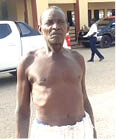
Atoke is a Nigerian writer based in Toronto, Ontario. She is author of ‘+234: An Awkward Guide to Being Nigerian’ which seeks to provide insight into what it means to be Nigerian. She currently works as Features Editor for BellaNaija.com. Here, she talks about her book, its making and more. Excerpts:
Bookshelf: For three years you wrote a weekly column for BellaNaija called Monday Morning Banter and ‘An Awkward Guide to Being Nigerian’ is a collection of some of those columns. What is the book about and why did you decide to make the compilation?
Atoke: ‘An Awkward Guide to Being Nigerian’ is a collection of essays that I worked on for years, in the process of trying to synthesize my message, to get Nigerians to do better and do different. What initially started as a fun column for me ended up becoming something serious. I would get messages and emails about how people were connecting to my writing and how I made their Mondays so much better. I felt that I had a responsibility to actually try to touch lives. I’m not a pastor but there I was on that podium and I knew I had to use it.
I knew that there was a world out there beyond BellaNaija. There are millions of Nigerians across the world and people struggling with inter-personal relationships, people trying to do better but couldn’t because they couldn’t break out of the cultural normative. That’s why I wrote this book. I wanted to reach everybody beyond the world of the internet.
Bookshelf: You talked about a lot of things, including child abuse, rape of minors, child abuse, and spousal rape. Did you grow up feeling this way?
Atoke: I feel this way every day, and I grew up feeling this way. I strongly believe that Nigerian women are regarded as lowly on the totem pole. We are not given a chance to take control of that one thing that is actually ours, our bodies. From a young age we are restricted and confined. As a teenager, I was repeatedly reminded that I was a girl. My dad did not permit us to grow our hair, so my hair wasn’t in my control. I hear stories about married women who say their husbands won’t allow them cut their hair. These are the things I struggle with and these are things I am hoping to change.
Bookshelf: Has being a feminist changed how you understand and think of men?
Atoke: Absolutely, yes. Hyper masculinity is something I’m constantly talking about. Why are men not allowed to cry? Why are men not socially shamed for carrying their women’s handbags? Why can’t a man like fashion? Why can’t a man be a father to his child in every sense of the word? I’m not talking about “photo op” parenting.
We should all be feminists, because it benefits both men and women. Do you know how many men commit suicide every day because they’re struggling to keep up this overly socialized idea of masculinity?
People think feminism is about hating men. No, feminism is seeking representation and equality for all genders. If you recognize your privilege, you would be able to speak up for the rights of the oppressed, and this is what I think about men. I feel that a lot of men don’t see their privilege. Men don’t really realize that it’s a privilege to walk down a street without a random Okada rider grabbing you.
Bookshelf: Your book is funny. Was this intentional?
Atoke: I don’t think it was deliberate. I write the way I think. A lot of my style comes from my thought process. I find that my personality takes over my writing. So, if my writing is funny, I guess I’m funny.
Bookshelf: The book is filled with anecdotes and conversations between you and your friends and family. These help prop up your points. Would you say that this makes the book more of an Atoke’s version of being a Nigerian or an authentic idea of what being a Nigerian is?
Atoke: I think it’s a mix of both in the sense that I acknowledge that my view of the world or the Nigerian space is limited to my experiences and my life. But I also read a lot and have lived and worked with people from a diverse facet of Nigeria. Also, when I meet people, I actually get to know them and ask a lot of questions. I do a lot of research about people, their lives and experiences. I never assume that my view of life is the way.
Bookshelf: In some areas, your book reads like a reprimand. What do you hope to achieve?
Atoke: I want Nigerians to do better and be better. I mean, we complain about our government every day. We complain about how we are poor and have no roads and good healthcare. However, we are responsible for these things. The little things we do add up to the bigger problems we are seeing. We have turned to normal so many awful things that we don’t even realize we are continuing a cycle of terrible behaviour. My aim is to highlight the little foxes and encourage us to chase them out of our vineyard.
 Join Daily Trust WhatsApp Community For Quick Access To News and Happenings Around You.
Join Daily Trust WhatsApp Community For Quick Access To News and Happenings Around You.


